- Home
- Alice Hoffman
The World That We Knew Page 8
The World That We Knew Read online
Page 8
After her sister’s death, Ettie had torn her clothes, but she hadn’t upheld the traditional mourning period of shiva, which lasts for seven days. She hadn’t wanted prayers or consolation. In the time after a loved one’s passing, mourners must not bathe or brush their hair or wear leather shoes, they must cover mirrors so as not to look at their appearance, for their own needs do not matter, and their grief is all-consuming. But Ettie’s grief had turned white-hot, burning inside of her. She wished to do more than mourn. She remembered the story of Esther, who had been called the Morning Star by her people, the Jewish queen who had lived in exile in Persia and used her beauty to beguile a king, disguising her brilliant mind, causing the king to save her people and her nation. Clearly, a woman could engage in battle. That was when her plan came into focus.
Ettie had heard rumors of underground groups that rescued foreign Jews, young people, and children and fought against the Germans, creating as much chaos as possible, destroying roads and train tracks with homemade bombs made of cheap ingredients, match heads, gunpowder, old nails and tacks, as they did their best to remove the most evil players among the Nazis stationed in their cities and towns. To prove that she, too, was ready to take radical action, Ettie challenged herself. There were days when she didn’t eat or drink, merely to toughen herself, and when she had time she often did push-ups of the sort her little brothers used to do, to keep her body in shape. One evening she took a sharp knife from the kitchen. In the shed where she slept, she cut an M into her arm in memory of her sister so that she would always remember what she was fighting for. In her faith she was never to cut herself, not in service of an idol or in the throes of grief, but Ettie’s faith was gone, and that command no longer mattered. She remembered Queen Esther’s cry to God. Why did you leave me? I call out to You in the day and You don’t answer.
Ettie was no longer the Orthodox girl who did as she was told. She was someone else entirely. To prove this to herself, she broke every rule she could. She worked on Friday nights, she ate pork, she let her hair loose and didn’t cover her head, she spoke with men she didn’t know while she served them their dinner, she didn’t burn candles or respect the Sabbath. God had forsaken her, and in turn she had forsaken His ways and His word. People barely glanced at her; she was thin and unkempt, with a haunted look in her eyes, no one worth looking at. This was the way she wanted it. Let her be invisible, a shadow who was overlooked. It was easier to pick up information if she went unnoticed, and plain girls always went unnoticed. She knew that thousands of young men and women, both French and Jewish, had escaped forced labor to disappear into the forests or safe houses in villages and towns in order to fight back against the Germans.
This was what Ettie wished for. A way to fight back.
In the café, she had overheard people speak about a local priest in soft, respectful tones. He was a supporter of France at all costs, and had already been interviewed by the police. Father Varnier was so beloved in the village that he had not been detained, as most prisoners would have been, only briefly questioned about his parishioners. Did he know where there were hidden Jews? Had he heard of convents taking in foreign children? Where were the members of the Resistance and their girlfriends and families, anyone who might be imprisoned and tortured for information? He knew nothing and spat out that they should be ashamed of themselves to mistrust a man of God. They let him go and wished him luck, but behind his back they laughed at him. What good would God do him if they decided to arrest him again?
Ettie made her way to the church, an ancient stone building in the middle of town, passing by the even more ancient relic of the obelisk. This part of France had been a Roman stronghold, and there were memorials to that time everywhere, with the past and the present threaded together. It was a land of martyrs, of those who had been betrayed and those who had betrayed them. Perhaps the one matter of faith that was most important, at least to Ettie, was that she must still find it in her heart to trust someone. That person was Father Varnier. It was dark in the church when she entered, and she felt a fluttering of nerves. She had never been inside a Christian house of worship. All she knew was her father’s study, which had served as a shul, a room that became crowded with his followers, who prayed with such enthusiasm the floor often shook. Here in the chapel, dozens of lit candles flickered and the stained-glass windows let through blue and rose light that left patterns on the stone walls. As she took a seat in one of the carved wooden pews where the faithful had prayed since the 1300s, Ettie was someone new, someone she had never expected to be. She saw the world in the light of the Morning Star, Queen Esther, for she, too, had been in exile when she had managed to save her people.
Ettie sat alone in the church for so long that the woman who swept up noticed her and went to Father Varnier, who soon enough came to see if Ettie was all right. He asked if she would like to pray with him, and she said no, she wished to do more than pray. She was so slight, hardly more than a girl, not especially pretty, except to those who had loved her, but she looked fierce, with a brittle sort of determination. She was pale beneath her freckled skin, and her eyes were luminous and damp. The priest didn’t need further evidence to know what she meant. He had ties to both the French who were loyal to Charles de Gaulle and to the Jewish Resistance. Still, he was cautious even when speaking with a girl of seventeen. This is what had happened to their people, a division that would take decades to heal. When Ettie greeted him, he took note of her faint German accent, and was aware that she was a refugee, a most dangerous thing to be. He told her she was taking a foolish chance speaking to a stranger. She responded that the same was true of him, but after all, weren’t fools the ones who were willing to do what others would not? Wasn’t this the true meaning of faith?
“I work in the café,” she told the priest. “Send whatever fool you know to find me. I’m willing to do anything.”
She didn’t flinch under his gaze, something the priest couldn’t help but notice. She shook his hand, quickly pulling her sleeve down so he wouldn’t notice the letter she’d carved into her skin. But he did, and he knew she was serious about matters; she had her own war to wage.
Ettie left and went through the old streets of Vienne. She took her time walking back to the café. She went to work, as she always did, but every morning and every night she was waiting for whatever was meant to happen next.
CHAPTER EIGHT
THE GIRL IN THE COUNTRY
HAUTE-LOIRE, SUMMER 1941
MARIANNE FÉLIX HAD LIVED IN Paris as the Lévis’ employee for five years, but she was a country girl, and was still able to find her way in the dark. It was a talent she’d learned during childhood on her father’s farm, a place he called Maison de la Ruche, Beehive House. In the dusky evenings she would go into the woods to look for the cows let out into the pastures. At first she had stumbled over bramble bushes and the twisted roots of oak trees, but after a time she realized night fell in different textures of black and blue. Some things turned the color of ink, some became ebony. It was easy enough to find the cows, gathered together in the soft darkness, and to go home she followed a trail of white wildflowers.
All the while she was growing up, each morning before daybreak, Marianne would awake to fetch eggs from the henhouse. She moved swiftly as she bent to reach under the hens, all of which complained when they were disturbed. The eggs were brown and blue and spotted, warm to the touch. She then helped with the bees, dressing in white with a net over her head. Sometimes she dreamed of the hum of their buzzing when they surrounded her on summer days, their feet dusted with pollen so that they left traces of yellow and green on her shoulders and arms.
Her mother had died when she was very young, and Marianne’s father depended on her. By the time she was seventeen, most other local girls had married, and the boys who once teased her fell away; soon they had families, and merely nodded when they saw her, as if they had never begged for a kiss. Every day was like the one before, not bad, merely the same. When she sat outs
ide in the evenings to gaze at the stars pricking the darkness, she was filled with longing. Fate was waiting for her, she just didn’t know where.
Their village was secluded and blizzards of snow fell. Sleds or snowshoes were needed to get anywhere, and for months the snow was too deep for cars; even horses and carts were useless. They were cut off from the rest of the world. It was possible to hear wolves from across the mountains in Italy. In the highlands there were wild mountain goats, called chamois, and little nocturnal animals called genets, which kept their distance from human beings. Occasionally, if one was very lucky, perhaps once in a lifetime, it was possible to spy a lynx. In summer, the forests were so thick a person could disappear into the mossy glens and never be found.
The villages and the farms for miles around were populated by Huguenots, hardworking men and women who were used to the deep silence of the mountains. In their world, churches were plain but forests were holy. Louis XIV had been brutal in forcing the Huguenots to convert or flee, and they were without the rights of citizens until 1789, after the Edict of Toleration was signed. Only a tiny fraction of Huguenots had remained in France and most of those were in the villages nearby. They were French, but they held themselves apart from all others, for they had been treated as outsiders, disrespected and imprisoned and murdered. One didn’t forget such mistreatment; it was in the blood, as much as these mountains were, for these mountains, impassable in winter, had saved their lives.
When Marianne was eighteen, she went to the market to sell eggs and a shock wave went through her. It happened for no reason and every reason. She looked at the road she had never taken any farther than town. She thought of all the things she would never see or do. Marianne was still young but life already seemed ordinary. It was the time of year when the chirping cri-cri bugs called and Osiris blue butterflies flitted along the hedges. Instead of going home that day, Marianne walked in the other direction. She trekked on until she came to a small town she had never been to before. She went to have a coffee at a café, and since she had her egg money she ordered a small cake as well. It was the first time she had eaten a cake that she herself hadn’t baked. It was made with apricots and sweet cheese and it was delicious.
Marianne still thought she was going home and had simply taken a detour. She would be back to look for the cows in the gloaming dark, and close the goats into their pens, and check her father’s beehives to see if there were enough honeycombs to sell. But instead she lingered until the proprietor asked if she was waiting for someone. And then quite suddenly she realized that she was and that she wanted something larger than the world that she knew. When she asked if there was any work she was told there was an organization in Lyon that found work in Paris for farm girls such as herself.
Marianne caught a ride to Lyon and sat in an office filling out a questionnaire. She didn’t think she did a very good job; she didn’t have much to say about herself, after all. It was too late to return and collect the cows, and she assumed her father was furious as he stumbled through the dark. She slept on a cot in a shabby room of the office, where country girls like herself came to search for work. Soon enough Professor Lévi sent her a train ticket and a cash payment for the organization’s fee. Before she knew it there she was, in the professor’s house. She couldn’t tell which was the dream, her life before Paris or this other life, wherein she planted the garden and watered the rosebushes. She pretended everything that bloomed was hers, every rose and peony, flowers she wouldn’t have had time to bother with had she been on the farm, for her father expected everything they did to serve a purpose and a rose had no purpose other than its own beauty.
She appreciated her life with the Lévis, her lovely pressed uniforms, her new coat and boots, a bureau filled with undergarments and scarves the lady of the house had offered when she’d grown tired of them. A girl who had had only cows for company had come to reside in the most beautiful city in the world. She spent hours walking in the Jardin des Tuileries and along the boulevards with their heavenly shops, buying ice cream on summer evenings and eating all manner of cakes, all more delicious than any of the ones she had ever baked. Sometimes she forgot that the house where she worked was not her own. Nothing was, really, not the kitchen, or her clothes, or the boys she had come to care for, perhaps, in Victor’s case, too much. In the last year, when she’d realized he’d become a man, it was awkward to be with him, especially when she noticed the way he looked at her. Perhaps her thoughts of leaving began then.
Or perhaps it was on the day she heard the professor’s wife speaking about her. Madame had called Marianne la fille, the girl, as if she had no name, and all at once she realized that, indeed, she had nothing of her own. Hadn’t that been why she’d left her father’s farm in the first place? To find something that belonged to her and her alone? That hadn’t happened here, and what was worse, the city had gone dark, all of the initial light she had been so amazed by disappearing day by day.
The Lévis did not understand their slow disenfranchisement and the erosion of their rights, but Marianne came from a line of people who had been persecuted by the Catholic majority; she’d grown up sitting in the town hall, hearing stories of mistreatments and murders. The residents of this region knew that people must seek protection before it was too late, and Marianne began to sense it was too late for the Jews. She heard what people were saying in the markets and was privy to displays of hatred that would have stunned the Lévis. All Jews were refugees, people said, even those whose parents and grandparents considered themselves French and had fought in the Great War. None were truly French, and all should be deported to Germany and Poland. Jews weren’t really people, they baked blood into their loaves of bread; their children were brought up to be thieves. No one wanted the Germans in Paris, but surely they would not be marching on France if not for the Jews.
Marianne hadn’t seen her father for five years, although they’d written letters all this time. Now, with the Germans on the streets of Paris, the guilt of leaving home struck her. Perhaps she had thrown the last few years away, dreaming. Certainly, she’d left her father with the work she herself should be doing to spare him a miserable old age.
Marianne had enough money for the train to Lyon, so she left, without speaking to Victor, who always got his way, to ensure she couldn’t be talked out of her decision. She had left behind notes for the boys. She wrote to Julien she would always be proud of him. Victor’s message took more thought, for he would be far more hurt when he found her gone. Marianne had told him stories about her father’s farm, the bees he kept, the road that was impassable in winter, the stars she gazed at each night. She wanted to say what she felt, she wanted to give away her feelings, but she told herself it was wrong.
In the end she wrote a single sentence.
Always remember me, as I remember you.
She took the train to Lyon, a bustling city that seemed even more crowded than she remembered. There was then a smaller train to the station in the center of Le Chambon-sur-Lignon. She still had to walk several miles in the hilly terrain. Theirs was an isolated community and the farm was even more isolated. It had been so long since she had been in the countryside that blisters formed on her feet. The weather was hot for the time of year, and there were bees buzzing in the air. Her father would likely be wondering what had happened to this week’s letter. He had never reprimanded her or asked why she’d left. Perhaps he understood she had reached a marriageable age and still was at home and that she wanted more. He often wrote about his bees, how much honey had been produced, how much he had sold at the market. When she thought of him she imagined him in his beekeeping attire, the frothy netting, the white cloak. He never wore gloves as she did; he said he needed his hands so that the bees would see he was indeed human and not a monster in their midst.
When Marianne arrived at the farm, her father was standing in the yard with his favorite goat, Bluebell. When he saw his daughter it was as if she had never been away. In an uncharacteristic display o
f emotion this rough-hewn man embraced her, then he wiped his eyes, and told her she was in time for dinner.
She settled in quickly. In less than a week, Bluebell became used to her when it was time for milking, and the chickens returned to be fed grain every evening when she called to them. Only the bees never became accustomed to her. As a girl she would let them hover near to perch on her arms. Now she had been stung several times.
“Bees are the least forgiving creatures on earth,” her father told her. She understood this was his way of letting her know that he forgave her for leaving, and that, all this time later, although he never said so and though he never would, he was overjoyed that she had come back at last.

 The Story Sisters
The Story Sisters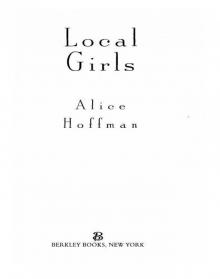 Local Girls
Local Girls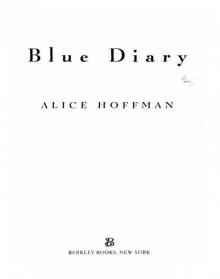 Blue Diary
Blue Diary The River King
The River King Here on Earth
Here on Earth Illumination Night: A Novel
Illumination Night: A Novel The Marriage of Opposites
The Marriage of Opposites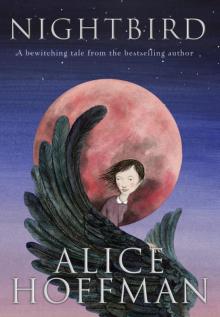 Nightbird
Nightbird Incantation
Incantation Skylight Confessions
Skylight Confessions The Ice Queen
The Ice Queen Second Nature
Second Nature Fortune's Daughter: A Novel
Fortune's Daughter: A Novel Seventh Heaven
Seventh Heaven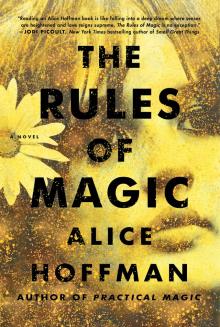 The Rules of Magic
The Rules of Magic The Red Garden
The Red Garden The Third Angel
The Third Angel White Horses
White Horses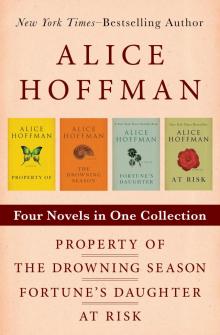 Property of / the Drowning Season / Fortune's Daughter / at Risk
Property of / the Drowning Season / Fortune's Daughter / at Risk Angel Landing
Angel Landing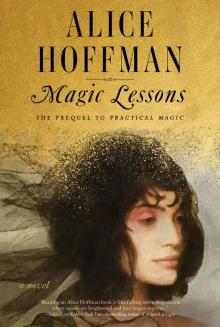 Magic Lessons
Magic Lessons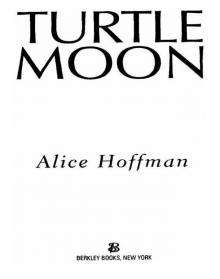 Turtle Moon
Turtle Moon Aquamarine
Aquamarine The World That We Knew
The World That We Knew Faithful
Faithful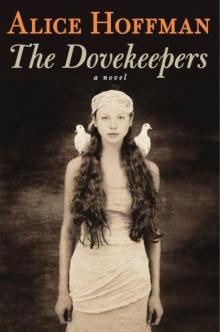 The Dovekeepers
The Dovekeepers The Foretelling
The Foretelling Green Angel
Green Angel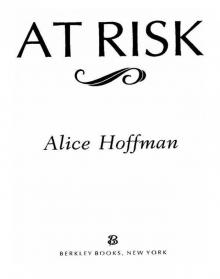 At Risk
At Risk Green Heart
Green Heart Fortune's Daughter
Fortune's Daughter Faerie Knitting
Faerie Knitting Incantation (v5)
Incantation (v5) Green Witch
Green Witch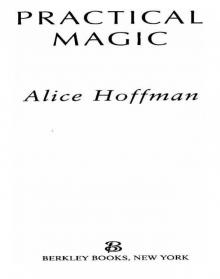 Practical Magic
Practical Magic The Museum of Extraordinary Things
The Museum of Extraordinary Things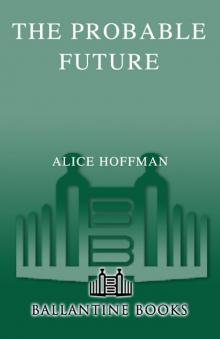 The Probable Future
The Probable Future Illumination Night
Illumination Night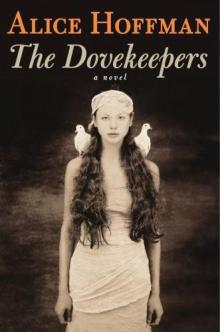 The Dovekeepers: A Novel
The Dovekeepers: A Novel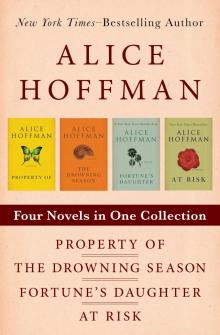 Property Of, the Drowning Season, Fortune's Daughter, and At Risk
Property Of, the Drowning Season, Fortune's Daughter, and At Risk